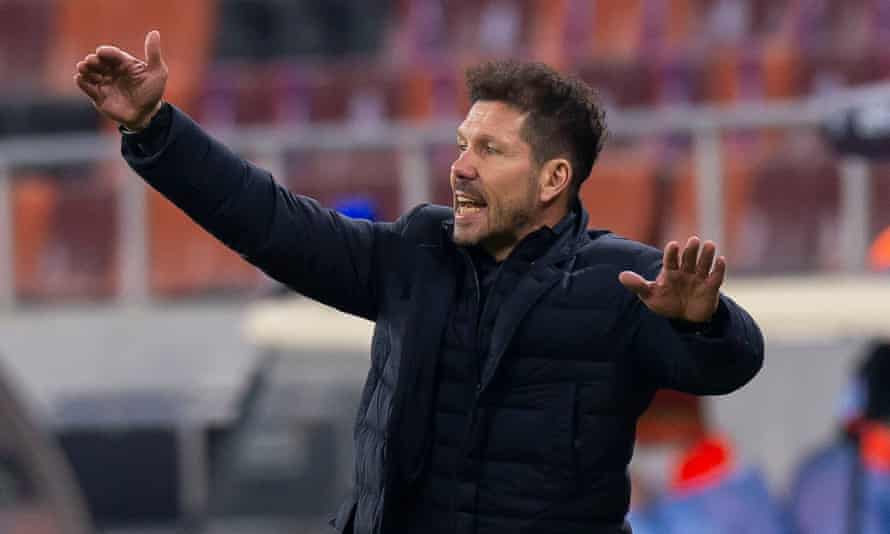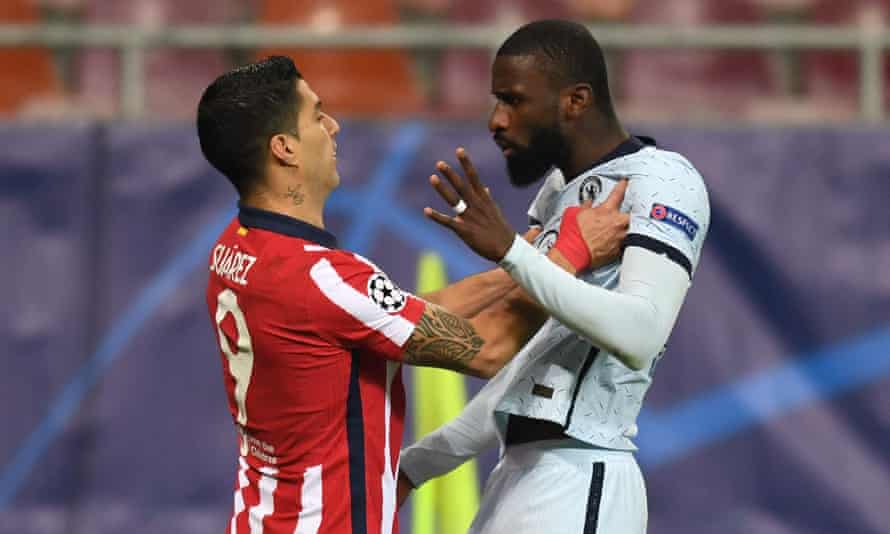Atlético Madrid went back to their origins but this team are not that one and the old plan didn’t come together. In the Bucharest stadium where they won their first trophy under Diego Simeone in 2012, a home from home 2,500km east of the Metropolitano, one aim took priority to the detriment of all others: do not concede. Once it might have worked and perhaps here it could have done, but it didn’t and that didn’t entirely surprise. With 20 minutes remaining, Olivier Giroud sent a superb overhead kick past Jan Oblak. “The game was decided by a detail,” said Koke Resurrección.
Some detail. And it was deeper than that. By the time this game ended, it was hard to avoid the conclusion that Chelsea had got what they deserved and harder still to avoid the conclusion that so had Atlético; that this was not just a detail, it was by design. Atlético had invited this, a lack of ambition hurting them. At the final whistle, they had not managed a shot on target. For too long, it had looked as if they weren’t really trying to. When they did it was too late: the damage was done.
It is not over of course, Koke quick to insist: “Atlético always get up again.” But Atlético have never progressed from a European tie having lost 1-0 in the home leg.
When Simeone named his lineup, it had appeared reasonably offensive. Four, not five, at the back. Saúl and Koke, rather than Geoffrey Kondogbia in the middle. Thomas Lemar on the wing. João Félix and Ángel Correa. Momentarily, they stepped up to Chelsea too, Saúl almost catching out Édouard Mendy, Luis Suárez out-thinking and outmuscling Antonio Rüdiger and Marcos Alonso to make an early chance for Lemar sliding in, and Correa almost finding Suárez by the six-yard box. Flashes of “vertigo” Simeone called them, brief glimpses of the transitions he had hoped for.
With time, though, came timidity, the initiative ceded to Chelsea. The question before the game had been whether Atlético would play with four or five at the back; as it turned out, it was more like six, in line across the edge of the area, another three just in front. Suárez was largely a lone figure without the legs to go long, and even he dropped in often. Félix barely saw the ball. That pattern emerged early and by the second half it was and irreversible. Chelsea looked to Oblak’s goal; Atlético looked only to the clock.
After the game Simeone was asked whether his team had lacked bravery. “No, I don’t think so,” he replied. On television, surprise was expressed at how deep Atlético had played, that they hadn’t pressed Chelsea more often – not least because in those brief moments when they had it had looked like a plan that could work. Simeone shot back: “What did you expect?”

Well, quite. This is in his character, they knew. As he noted: “We always want organisation, a strong block.” Besides, there was a sense in the thinking, other reasons. Fourteen players have had Covid – so has he – and there have been injuries and suspensions, fatigue. Since Kieran Trippier’s suspension they have played five different right-backs. Here it was their best midfielder Marcos Llorente who again filled in, and Simeone knows that costs them offensively. Yannick Carrasco was absent. Then there’s the fact that the away goals rule puts a premium on not conceding at home. And this was not even at their actual home, perhaps urging even more caution.
It has often served them well, in any case. Last year a 1-0 at the Metropolitano was the platform from which they knocked out Liverpool. When they eliminated Chelsea in 2014, it was after a 0-0 at the Calderón. It is something they are good at.
Or is it? And should it be? Nine years have passed since Atlético won the Europa League in Bucharest. It was Simeone’s first season, having taken over with the team four points off relegation, an extraordinary achievement that was the start of a seismic shift. A league and two Champions League finals are among what has followed. There has been a huge leap institutionally, an increase in the demands. Countless players have been and gone. Of the team that won that final, only Koke is left – and he was a 20-year old who came on in the 90th minute.
The team is different now. This season especially. This team, top of the league, is supposed to have another identity. They do have another identity, in fact. Or did until Tuesday night, when there was a feeling of regression, of them going back to their origins, an identity from which they had moved on. This Atlético had more possession, played higher up, scored more goals. Suárez took them closer to the opposition’s area. This was a team that, while some values remain eternal and unchanging, attacked. One that might have attacked Chelsea but instead appeared to assimilate their inferiority.

A deeper question reappeared here, asked with increasing urgency and fatalism: is there something wrong with Spanish football? It may be premature, unnecessarily alarmist but after Barcelona, Sevilla and Atlético lost the first leg of their Champions League ties, and Real Sociedad conceded four to Manchester United in the Europa League, might this even be the end? If the best team in La Liga took that approach against the team fifth in the Premier League, is there a problem?
More immediately was it the best plan? If, indeed, it was the plan, not a product of their opponents’ performance. And do Atlético’s problems run deeper? Was this the best way to remedy them? They had chosen to protect themselves when perhaps that’s no longer what they’re built for. They had tried to do something they look less equipped to do now: this was the eighth consecutive game in which they have conceded.
Sign up to The Recap, our weekly email of editors’ picks.
There is always an element of short blanket syndrome, and the coach could be forgiven for believing that his choice to pull it towards his feet was 20 minutes from being justified. He was not wrong when he said: “There were very few chances for either team.” It is not as if Oblak made a catalogue of astonishing saves.
But as Simeone said: “What could have been, what might have happened, doesn’t help now.” What did happen was that they were beaten again, losing two games in a row for only the second time under Simeone. They have dropped more points in 12 days than in the rest of the season put together. Atlético had won once in four; only rarely did they seem determined to make that two in five, the draw they sought becoming a defeat and obliging them to come up with another plan for the second leg.
“We’ll go there to win,” Koke said. “There’s no other option.”
from Football | The Guardian https://ift.tt/3dDUTTL
via IFTTT

No Comment